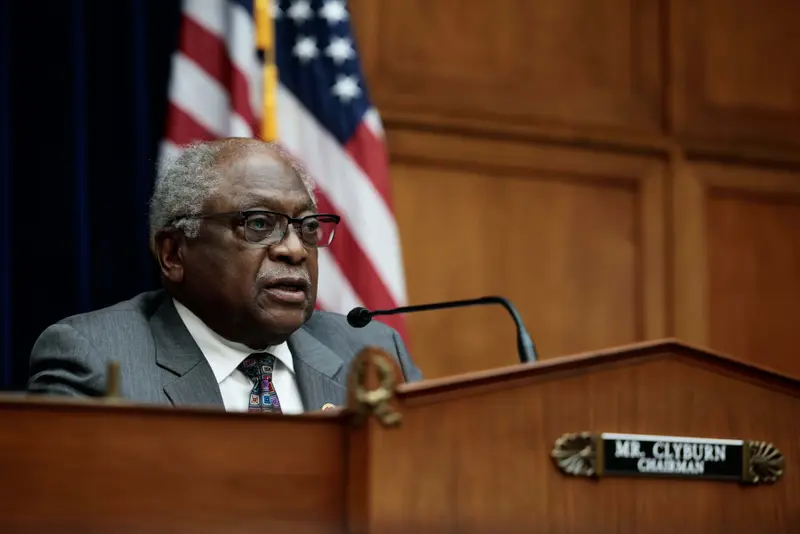Democratic Rep. James Clyburn’s role in South Carolina’s 2022 redistricting has emerged as a central point of contention between Democrats and Republicans in a racial gerrymandering case to be argued before the Supreme Court on Wednesday.
The case revolves around whether Republicans, who control the Legislature, illegally disenfranchised Black voters when they created new election maps or whether the process was simply partisan politics. A key question is whether the role that the powerful Black Democrat played in the process was enough to inoculate the entire effort.
At the beginning of the process in November 2021, a top Clyburn aide secretly delivered a one-page map to the Republicans. That was the starting point for a formal redistricting plan that went through numerous revisions before the Legislature approved it in 2022. The NAACP sued state Republicans, arguing that the plan discriminated against Black voters. A three-judge federal panel sided with the NAACP early this year and ruled that one congressional district in the plan, the 1st District, is an illegal racial gerrymander and must be redrawn before the next election. ProPublica detailed Clyburn’s involvement and was first to publish his map in a May 5 investigation.
In their legal filings, Republican leaders contend they did not take race into account when they redrew the districts. They say they complied with acceptable redistricting principles. And they contend that Clyburn’s recommendations played a key role in starting the process. If the lower court’s ruling is allowed to stand, they argue, it “would invite federal courts to micromanage political disputes in countless such districts across the country.”
In a recent filing in response, the congressman’s lawyers argue that Republicans are trying to blame Clyburn, a state civil rights leader, for an “unconstitutional racial gerrymander intentionally designed to dilute minority voting power.” He supports the NAACP case and asked the high court to affirm the federal judicial panel.
Clyburn’s redistricting involvement was “routine and circumscribed.” The draft map his aide gave to Senate Republican staffers was only a rough idea for how to draw his district, not a formal redistricting plan for the entire state, his lawyers argue.
The decision will help define a murky point of redistricting law: when a partisan gerrymander crosses the line to become an illegal racial gerrymander. The Supreme Court in 2019 held that it would not interfere in partisan map-drawing. But federal courts have overturned redistricting plans in which racial considerations played a predominant role.
The case is being closely watched by other Southern states facing redistricting challenges. Parties in a federal racial gerrymandering case in Tennessee, for example, have decided they will await the court’s South Carolina decision before beginning their own pretrial document discovery.
In June, the court surprised observers by rejecting Alabama’s redistricting as discriminatory, a ruling that may affect maps in several other states and give Democrats a shot at winning as many as six seats in the South in the 2024 elections.
In South Carolina, race and politics are inextricably linked, and the state has a long history of racial discrimination and violations of the 1965 Voting Rights Act. The Republican Party is predominantly white and controls the Legislature, major state offices and six of the seven congressional districts.
Between the 2010 and 2020 censuses, South Carolina experienced an influx of people who were disproportionately white. The 1st District, a swing district, had too many people and the 6th District, which Clyburn has held since 1993, had too few.
The case revolves around the question of whether the 1st District was an illegal racial gerrymander. Republicans made it much safer for their party. As recently as 2018, a Democrat held the 1st District. It is now held by Nancy Mace, who ran as a moderate but recently has risen to prominence as one of eight Republicans who voted to depose Kevin McCarthy as U.S. House speaker. In 2022, she won by 14 percentage points.
Republicans made Mace’s district safer by taking Black neighborhoods out and putting some into the 6th District. The result was that Clyburn solidified his hold on the district as its population rapidly changed.
In doing so, they say they followed the outlines of Clyburn’s early map. It had suggested moving neighborhoods that are disproportionately Black into his district and out of the 1st District. It also recommended moving some heavily white neighborhoods into Mace’s district, strengthening the GOP’s hold. Republicans say that Clyburn suggested moving even more Black residents into his district than they eventually approved.
The 1st District ended up with a Black population of 17% in a state where the overall Black population is 26%.
In his brief to the court, Clyburn’s attorney, John Graubert, accused Republicans of trying to “blur the distinction” between the congressman’s rough recommendations and the final plan.
Graubert insisted that Clyburn’s involvement is legally irrelevant to a case that will decide whether the GOP-led Legislature “engaged in intentional racial discrimination.”
The Legislature’s case is being presented by William Wilkins, a former chief judge on the 4th U.S. Circuit Court of Appeals, and John M. Gore of Jones Day, who served in the Trump administration as acting assistant attorney general for the Department of Justice’s Civil Rights Division.
The court is expected to decide by early next year if it will uphold the three-judge panel’s ruling in the case, known as Alexander v. South Carolina State Conference of the NAACP.
Rick Hasen, a legal scholar at the University of California, Los Angeles, said deciding the line between partisan and racial gerrymandering is a “recurring issue” for the court as both political parties bring cases alleging violations of the Equal Protection Clause.
“When the state says it’s about politics, and the plaintiffs argue that it’s about race, how are you supposed to disentangle those two things?” he said.










